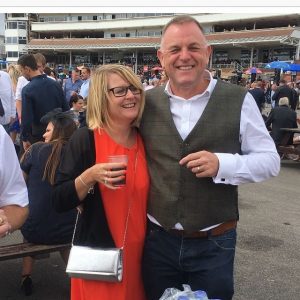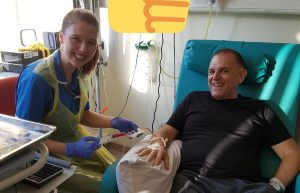For a couple of weeks Andy had been feeling a bit sick but didn’t think too much of the discomfort at the time. But when the symptoms resurfaced at a party celebrating his wedding anniversary and forced him to go to bed, he knew he had to get checked.
That night, at Southampton General Hospital, Andy had a blood test in the very early hours of the morning, and nervously waited all night with his wife Stephanie for the results.
Andy Ayres,It started with an uncomfortable feeling in my upper stomach – a slight sickness – on and off for a couple of weeks.
But when the doctor examined him, there was seemingly no evidence of anything sinister, he was offered two options: some medication to improve the feeling of sickness, or further examinations.
“I was happy to take the pills – I didn’t want to cause any more trouble or take the doctors’ time. But thankfully, Stephanie interjected and insisted on the option of progressing the matter.”
By the Tuesday, Andy had an appointment with an oncologist – and despite vague symptoms, a CT scan was swiftly arranged for the following day, with a results appointment later in the week. A nodule had been discovered where the small intestine meets the large intestine, and an endoscopy was required to confirm its severity.
Within a few days, Andy had gone from discomfort to a likely cancer diagnosis. When it was confirmed shortly afterwards that he had non-Hodgkin lymphoma, Andy felt numb.

“I was terrified at first. And then I went through all the emotions. I remember a huge feeling of guilt – for causing so much upset and pain for my family and friends. They were shocked and devastated at the news.”
Andy, Julia, and their son Dean met with Peter Johnson, Professor of Medical Oncology at the Centre for Cancer Immunology, to discuss his options. They were introduced to ACCEPT – a Phase II trial of immunotherapy drug acalabrutinib, used in conjunction with chemotherapy – which Andy was more than happy to participate in.
Over the following eight months, Andy was spending up to four days a week at the hospital. His chemotherapy was deferred on several occasions due to low blood counts, but the immunotherapy treatment offered hope.
“At many stages throughout the treatment, I kept worrying about how serious my situation was. I feel that as soon as you’ve had a diagnosis like this, you must live with the fact that it may not go away forever – even if you’re given the all-clear at some point. And you must try and put that to the very back of your mind so that you can have some sort of normal existence.”
The immunotherapy treatment I received was very good indeed, and favourable to the chemo. The only side effect I experienced was some slight bruising on the face – nothing more. I would not hesitate in recommending immunotherapy.
Andy was astounded; his treatment was a success. The immunotherapy put him in remission in less than a year. He continues to feel well, remains extremely grateful to all those involved, and has a whole new outlook on life.
“I now appreciate time with my wife, family, and friends more than ever before. I always remember one of the wonderful research nurses shortly after my diagnosis saying ‘this is just a period of time’, and I believe that period of time has now passed. I’m looking forward to the future, working less, and having more quality time – since none of us really know what’s just around the corner.”
Trials have now resulted in the immunotherapy drug being approved for use in the NHS – without the need for chemotherapy. And as just one of Southampton’s many success stories, Andy understands the value of research and clinical trials into cancer immunology.

“Although it could sometimes be more time-consuming than the standard treatment, I can’t emphasise enough how worthwhile and meaningful the immunotherapy trials and research felt. In some strange way, it’s all quite rewarding – like you’re contributing to science and helping with future treatments.
“Nothing moves forward without trials. And I wouldn’t have been able to have this amazing immunotherapy treatment without others funding and undertaking trials before me. It’s that simple.”
“Although it could sometimes be more time-consuming than the standard treatment, I can’t emphasise enough how worthwhile and meaningful the immunotherapy trials and research felt.”
“I consider myself very fortunate – not only to have been diagnosed early, but also to have had this amazing immunotherapy treatment at Southampton, given by selfless people.”
I consider myself very fortunate – not only to have been diagnosed early, but also to have had this amazing immunotherapy treatment at Southampton, given by selfless people. I cannot thank the incredible doctors and researchers enough – I cannot express how grateful I am in words.